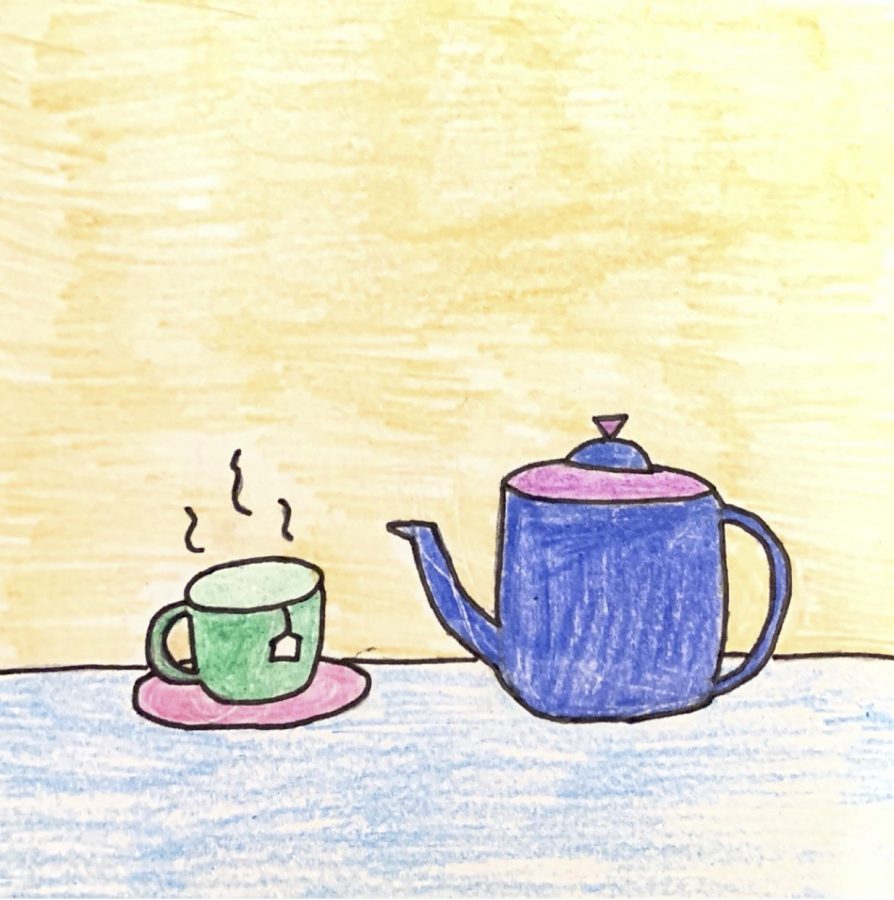10 tips for stress management during COVID-19
Drinking caffeine free tea is another effective method for reducing stress.
Disclaimer: These tips should not be used in place of professional mental health advice, but please feel free to use them as supplemental information.
Taking care of your mental health is important, especially with the COVID-19 pandemic. You may feel more stressed than usual, especially with the rapidly changing news and uncertainty of the future. However, managing stress does not have to be difficult, and you can combat it with healthy habits. These tips below offer a few suggestions, and can be followed at any time throughout the pandemic.
1. Create a daily routine for yourself
This is a helpful way to keep yourself grounded. Humans thrive off of having structure in their day, and without it, many people feel overwhelmed with their work. Having a daily routine works well with synchronous classes, so this will certainly be very helpful when the school year starts up again in your own home. Try to wake up at the same time each day and eat meals around the same time, too. With synchronous classes, there will be a short break in between each class, so you are free to get up from your desk and walk around. You could also go outside during lunchtime. Maybe you will work out every afternoon after virtual classes conclude for the day. If the school later enacts an asynchronous model for distance-learning, you can continue to schedule a certain amount of time dedicated to schoolwork, and give yourself 15 minute breaks in between. You could also add some fun social-distancing activities with your friends on the weekends. Perhaps every Sunday could be a Netflix Party day?
2. Stay (virtually) in-touch with your family and friends
Even while social distancing, you can still virtually connect with family and friends! Reaching out to them can prevent increased worry and loneliness. Send a text to or call your loved ones every so often. As for your friends, see if you can set up a group video call once a week — or even more often — with them; it is likely to brighten your day. There are a number of games you can play over video calls, too: Heads Up, Pictionary, cards (via PlayingCards.io) and more!
3. Limit how often you’ll read/watch the news in a day
To make sure you are staying safe and taking care of yourself, it is important to keep up with the news. However, if you find yourself looking at the news too often, it can prompt your body’s fight-or-flight response. The fight-or-flight response is activated when you are extremely stressed or when your body assumes that you are in danger. It causes you to release stress hormones such as cortisol and adrenaline. To prevent this, the British Broadcasting Corporation (BBC) recommends looking at the news once a day and finding a few trusted sources for current information on the virus.
4. Spend time outdoors
Taking walks outside is great exercise, plus it helps refresh your mind. Researchers at Harvard have found that spending more time outside lowers people’s stress levels. It was determined that listening to the sounds of animals in nature and spending time in complete silence outdoors both had beneficial results. The researchers concluded that spending around 20 to 30 minutes outside at least three days a week is a good baseline. Work this into your schedule and you are likely to see results.
5. Practice deep breathing techniques
Deep breathing allows you to release pent-up energy, which could otherwise present itself as additional stress. Box breathing is a method of breathing intended to help combat your stress. Find a comfortable place to sit down and feel free to close your eyes if it helps you concentrate. Breathe in while slowly counting to four; hold your breath for another four seconds; exhale for four seconds; and at the end of your exhale, pause for four seconds. Repeat the process three more times or until you feel more relaxed.
6. Lend a hand to others
Helping others improves your wellbeing over time. You can volunteer at the Arlington Food Assistance Center (AFAC) or get groceries for your neighbors. There are many creative ways to help those around you. Assisting others can give you a sense of community, especially when helping those living near you. There is also a strong correlation between helping others and increasing personal happiness.
7. Make time for a workout
Exercise helps boost your immune system, which is crucial in the times of COVID-19. Your body also releases endorphins when exercising, which are chemicals that make you feel happier. There are a huge variety of workouts on YouTube that you can follow, from HIIT workouts to strength training to yoga. Orangetheory has also been offering free daily workouts on their website.
8. Challenge negative thoughts
It is completely normal and understandable to feel overwhelmed and unsure during COVID-19. However, by focusing on what you cannot control, you may find it more challenging to cope with the situation. If it helps, write down a list of things or experiences that bring you joy so that you can read them if you find yourself in a bad headspace. Whenever a thought pops into your mind that seems overwhelmed or powerless, tell yourself that there are things you can control — you can choose whether to read or watch a TV show — and take small steps. Challenging negative thoughts takes time, but it can genuinely benefit your mental health in the long run. The National Center for Post-traumatic Stress Disorder (PTSD) has a list of statements here that you can say to yourself or read to help combat unhelpful, negative thoughts.
9. Start a journal
Journaling can help you reflect on your day and the process of writing out your thoughts can help you slow down during uncertain times like these, in which your mind may be running too fast. It also allows you to acknowledge your feelings and validate them. You can write anything you want in your journal. There are numerous journaling prompts that you can find online, such as: writing about one good thing that happened that day, new hobbies you have picked up, lists of the best and worst things about quarantine and more. Here is a link to journaling prompts that allow you to reflect on the pandemic and your experiences throughout. If you would rather not journal about the pandemic, this list of journaling prompts may be a better option.
10. Don’t be afraid to ask for or seek out support if you need it
There are many people out there who care for your health and mental wellbeing, such as your family and friends. You can also consider virtually speaking to a professional if that is better suited to your needs. Arlington Public Schools (APS) has created a virtual center for COVID-19 resources that both parents and students can use. This fall, APS staff is also receiving trauma-informed schools training in order to support students struggling emotionally in the time of COVID-19. The Centers for Disease Control and Prevention (CDC) also has a list of mental health resources on their website, and includes numbers to call if you are in a crisis and need immediate assistance.













